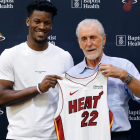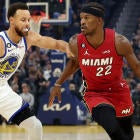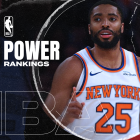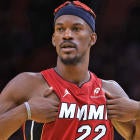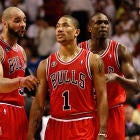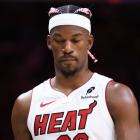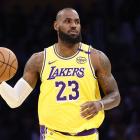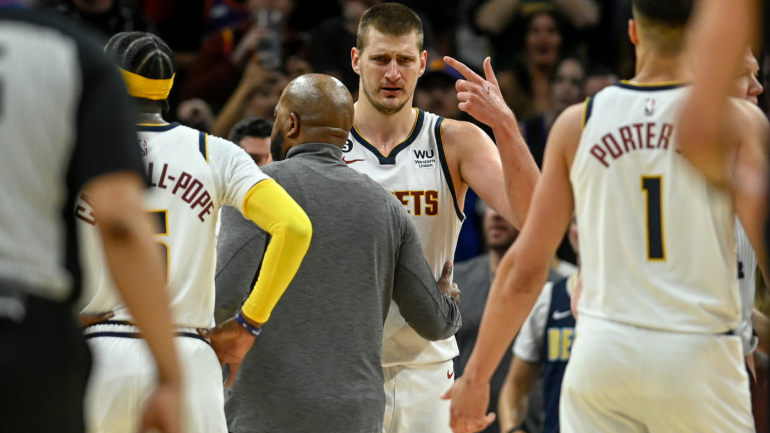
It's rarely discussed nowadays, but in 2007, NBA discipline effectively decided the championship. At the end of Game 4 of the second-round series between the San Antonio Spurs and Phoenix Suns, Spurs big man Robert Horry gave two-time MVP Steve Nash a dirty hip-check into the scorer's table. The Suns were livid. Not only did his teammates on the floor rush to Nash's defense, but key Suns players Amar'e Stoudemire and Boris Diaw left the bench area and attempted to make their way toward Horry.
NBA rules expressly forbid this, though, and Stoudemire and Diaw were suspended for Game 5. San Antonio won, eventually knocked Phoenix out in six, and went on to win the championship with their most dangerous opponent eliminated on a technicality. Now, 16 years later, the NBA faces an eerily similar situation.
On Sunday, those same Suns played Game 4 of a second-round series. This time, it was against the Denver Nuggets. A two-time MVP playing for the other side, Nikola Jokic, attempted to quickly grab a ball that had gone out of bounds to initiate a fast break. The ball happened to be in the hands of Suns owner Mat Ishbia, who refused to give it to Jokic. After a brief struggle for the ball, Ishbia knocked it away from Jokic. He then put his hand on Jokic's hip, and Jokic responded with a shove. He was assessed a technical foul. The game moved on. The Nuggets lost.
But Suns fans haven't forgotten that fateful night in 2007, when the team's best chance at its first championship was taken by a quirk in the rulebook. Many now expect Jokic to be held to the same standard, and are calling for a suspension in Game 5. Will that suspension come? Well... there's not a clear answer here. So let's go through this piece by piece and attempt to figure out what the league will do about Sunday's sideshow.
What rule did Jokic violate? What about Mat Ishbia?
NBA Rule 12A, Section Vl4 states that "a player, coach, trainer, or other team bench person must be ejected for deliberately entering the stands other than as a continuance of play." The stands, for the purposes of this rule, are defined as the first row of seating. Already, we have a murky situation to dissect.
Jokic did not enter the stands as a continuation of play. Doing so would mean chasing a live ball as it went out of bounds. However, he did enter the stands for basketball reasons. He did not seek out a confrontation. He was attempting to inbound the ball. Ishbia, technically a spectator, interfered with his ability to do so. The NBA does account for fan interference on live balls. See this play, for example: In 2011, Nash attempted to save a ball that was going out of bounds, but a fan interfered with it. The Suns were awarded possession.
This was not a live ball, and possession was not in dispute, so fan interference was not called. The NBA does include delay of game penalties, and they are enforced in the following manner: "A delay-of-game shall be called for preventing the ball from being promptly put into play, interfering with the ball after a successful field goal or free throw or failing to immediately pass the ball to the nearest official when a personal foul or violation is assessed." These rules are meant to apply to players, however. Ishbia did prevent the ball from being promptly put into play, so he technically committed a violation. It was not called.
Obviously, Jokic was not ejected from the game. Crew chief Tony Brothers felt a technical foul was sufficient, as he explained to a pool reporter after the game. "I just deemed the technical foul the appropriate penalty for what happened over there," Brothers said. "He didn't just run over and hit a fan. There was some engagement, so I deemed the technical foul the appropriate penalty." While he did not say this explicitly, Brothers hints at another possible reason Jokic was not ejected.
Jokic did not technically go into the stands. While the stands technically begin at the first row of seating, Ishbia was standing up and had taken a step forward onto the court. From this perspective, it could be argued that Ishbia was actually encroaching upon Jokic's space. The NBA fan code of conduct states that "guests who engage in fighting, throwing objects or attempting to enter the court will be immediately ejected from the arena." Ishbia didn't exactly run onto the court, but he moved forward in a way that interfered with play. A normal fan likely would have been ejected for the incident, and one fan was moved as a result. Ishbia was not ejected.
He did, however, make initial contact with Jokic. While that contact was slight, he placed a hand on Jokic's hip before Jokic shoved him. This situation is so specific that the league does not have guidelines governing it, but it could easily be argued that Jokic was acting instinctually in self-defense against a spectator who had already interfered with game play. Jokic himself argued that Ishbia should have been ejected. "He's a fan, he's supposed to get kicked out if he's influencing the game," Jokic said.
With all of this in mind, either side could credibly argued that the other is the one that deserves discipline. So, what does league history say will happen?
Is there precedent here?
Any precedent that we cite needs to be taken with a grain of salt. This situation, specifically, is unprecedented. The NBA takes confrontations between fans and players extremely seriously... but they are remarkably rare nowadays. The last player to be suspended for a fan interaction was Antonio Davis in 2006. The difference was that Davis actually entered the stands to confront a fan that he believed was harassing his wife. He was given a five-game suspension for that.
The far more noteworthy example took place in 2004, during the infamous "Malice at the Palace" brawl in Detroit. Indiana Pacers forward Ron Artest ran into the stands to fight a fan who had thrown a beer at him. Several players were suspended, including Artest, who sat out the rest of the season. Once again, the difference between that incident and this one was enormous.
Players may not have faced recent suspensions for entering the stands, but an assistant coach did as recently as last season. Wizards assistant Mike Batiste was suspended two games for attempting to confront a fan during a home game against the Miami Heat in February 2022.
The incident with a fan and the Wizards bench in which Harrell had to intervene: pic.twitter.com/IiNXUp7Z8x
— NBC Sports Wizards (@NBCSWizards) February 8, 2022
In this case, Batiste, already sitting in the second row as an assistant, moved deeper into the stands to confront a fan. He was held back by Montrezl Harrell. After the season, Batiste left the Wizards to join the Houston Rockets. However, as recently as this incident took place, it likely holds little bearing over the Jokic situation.
There is one precedent worth monitoring here, though, and it relates to Ishbia. During the 2019 NBA Finals, Golden State Warriors minority owner Mark Stevens was caught grabbing and shoving Toronto Raptors guard Kyle Lowry after he chased a loose ball out of bounds.
Stevens was ejected from the arena, banned from all Warriors facilities for one year and fined $500,000 for the incident. Yet we can still hardly treat it as a fair precedent for Ishbia, whose contact with Jokic was minimal. Ultimately, there simply isn't much of a history in the NBA of incidents like the one between Jokic and Ishbia taking place. The league, to some extent, is flying blind. That gives it a bit of leeway.
How strictly does the NBA enforce these rules?
David Stern was a firm believer in following rules to the letter. The 2007 series between the Suns and Spurs was a clear example. Leaving the bench area during a fight warrants an automatic suspension, so Stern suspended Stoudemire and Diaw regardless of fan backlash. The NBA continues issuing such suspensions to this day. Jokic himself has even earned one. But consider this moment during Game 1 of the 2018 NBA Finals.
Kevin Love told me he left the bench in OT to argue the call on Tristan, walking onto the court to get in the officials' eyeline, not in reaction to any scuffle & before it even broke out. Video (via @bballbreakdown) seems to back this up; not sure if it will matter to the league pic.twitter.com/JeHmd6Fl2p
— Rachel Nichols (@Rachel__Nichols) June 1, 2018
While Love explained to Rachel Nichols that he left the bench to argue a call, he did technically leave the bench during a fight. By the letter of the law, he should have been suspended. Stern likely would have suspended him. But Stern was no longer the commissioner in 2018. Adam Silver was, and Love ultimately was not suspended. Silver has typically been far more relaxed when it comes to discipline, and that is ultimately the only precedent that matters here.
So... will Jokic be suspended?
In all likelihood, Jokic will not be suspended. We can point to the vagueness of the rules we've cited throughout this story as the reason why, but there's a far simpler explanation: the NBA is a business. The league wants to put out an entertaining product that fans will watch. The Suns and Nuggets are in the middle of an incredibly exciting series. The winner will have a strong chance to win the championship. It is absolutely not in the league's business interests to ruin that series by taking a two-time MVP off of the floor for a critical game.
For what it's worth, Ishbia commented on Monday morning, tweeting that he did not think Jokic should be suspended or that anyone involved should be fined.
Great win for the Suns last night in an amazing series so far!
— Mat Ishbia (@Mishbia15) May 8, 2023
That should be and is the only story. Suspending or fining anyone over last nights incident would not be right. I have alot of respect for Jokic and don’t want to see anything like that. Excited for game 5! Go Suns!
Now, this does not mean rules will never be enforced. They exist for a reason, and when the league has no choice, it will discipline players. It has already issued two suspensions for former All-Stars this postseason: one for Draymond Green and another for Dejounte Murray. But when there is gray area, as there clearly is for Jokic, Silver tends to veer on the side of not interfering with the league's product.
So will Jokic be fined? Probably. Ishbia probably will be as well. But the odds of the NBA intentionally ruining one of the most exciting games of its season seem slim.









